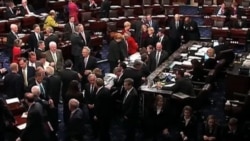The U.S. Congress is idle this week, but lawmakers are reacting to President Barack Obama’s speech on Friday announcing changes in U.S. intelligence operations. Legislators’ perceptions matter because congressional action will be required to enact some of the reforms sought by Obama.
The president announced changes in the storage of bulk data, called metadata, collected by the National Security Agency and proposed procedures the U.S. government must follow to access that data. He also attempted to reassure the international community that the United States is judicious when it comes to spying abroad.
“The bottom line is that people around the world, regardless of their nationality, should know that the United States is not spying on ordinary people who do not threaten our national security, and that we take their privacy concerns into account in our policies and procedures. This applies to foreign leaders, as well.”
The speech was ground-breaking, according to Republican Congressman Michael McCaul, who appeared on ABC’s This Week.
“What he did was, for the first time, explain these programs and defend them. I think metadata, most significantly, will not be dismantled, but rather will be put in the hands of an outside, third party. I think what gave most Americans heartburn was that this data was being stored under the NSA and warehoused under the government and this administration, who, you know, quite frankly, has some trust issues," said McCaul.
Another Republican congressman, Mike Rogers, applauded Obama for defending intelligence gathering as necessary and proper. He spoke on CNN’s State of the Union.
“We have to come to the conclusion as Americans, can you put the proper oversight on these programs? I think we have. I think we did. Both under [former president George W.] Bush and under Mr. Obama, to make sure we have a program that fills the gap that we know we missed on the 9-11 September attacks,” said Rogers.
Congress takes the issue seriously and will act, says Democratic Senator Patrick Leahy, who spoke on Fox News Sunday.
“The concern everybody has is allowing our government to have such a reach into your private life - my private life and everybody else's, that we have a government controlling us instead of us controlling the government. And that's what both the Republicans and Democrats are joined together on the Hill to try to change,” said Leahy.
Lawmakers will weigh in more fully next week, when Congress returns from a break. Obama likely will renew his call for intelligence reforms in his annual State of the Union address January 28.
The president announced changes in the storage of bulk data, called metadata, collected by the National Security Agency and proposed procedures the U.S. government must follow to access that data. He also attempted to reassure the international community that the United States is judicious when it comes to spying abroad.
“The bottom line is that people around the world, regardless of their nationality, should know that the United States is not spying on ordinary people who do not threaten our national security, and that we take their privacy concerns into account in our policies and procedures. This applies to foreign leaders, as well.”
The speech was ground-breaking, according to Republican Congressman Michael McCaul, who appeared on ABC’s This Week.
“What he did was, for the first time, explain these programs and defend them. I think metadata, most significantly, will not be dismantled, but rather will be put in the hands of an outside, third party. I think what gave most Americans heartburn was that this data was being stored under the NSA and warehoused under the government and this administration, who, you know, quite frankly, has some trust issues," said McCaul.
Another Republican congressman, Mike Rogers, applauded Obama for defending intelligence gathering as necessary and proper. He spoke on CNN’s State of the Union.
“We have to come to the conclusion as Americans, can you put the proper oversight on these programs? I think we have. I think we did. Both under [former president George W.] Bush and under Mr. Obama, to make sure we have a program that fills the gap that we know we missed on the 9-11 September attacks,” said Rogers.
Congress takes the issue seriously and will act, says Democratic Senator Patrick Leahy, who spoke on Fox News Sunday.
“The concern everybody has is allowing our government to have such a reach into your private life - my private life and everybody else's, that we have a government controlling us instead of us controlling the government. And that's what both the Republicans and Democrats are joined together on the Hill to try to change,” said Leahy.
Lawmakers will weigh in more fully next week, when Congress returns from a break. Obama likely will renew his call for intelligence reforms in his annual State of the Union address January 28.





